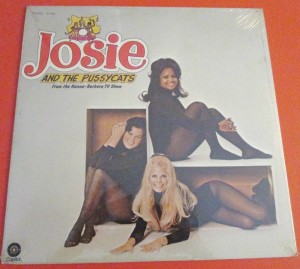 by Joe Wallace
by Joe Wallace
When I am not freelancing, I sell vinyl records on Etsy, Discogs.com, and on my vinyl blog Turntabling. Vinyl records is a passion of mine and also an additional revenue stream for me, helping me stay in business as a freelancer and remain generally self-employed.
Believe it or not, the two worlds have a LOT in common. The whole reason I turned to vinyl in the first place, years ago, was because of the freelancer’s need for diverse income sources. Clients come, clients go. Some pay on time, some never do.
So diversifying the income portfolio, as it were, is a must–you want to eat every day? Make sure you have three or more checks arriving at various times in the month. Save up a cushion to deflect the problems created by those late-payers. That’s the message the freelance life has consistently given me since I started in 2002.
But the most fascinating things I’ve learned about freelancing from vinyl records can really be summed up by that Josie and the Pussycats vinyl record you see here. Look at this thing! You probably laughed when you spotted it, right? But here’s a fascinating little piece of data–that record is, at the time of this writing, up for sale on Ebay (not by me) for TWO HUNDRED DOLLARS.
It’s sealed, very hard to find, and somebody might actually pay that $200 to get it. MAYBE NOT–but there’s actually a chance, because of that tricky combination of nostalgia, impulse buying, and the near-eternal appeal of vinyl records for some.
The lessons I take away from this for the freelance life? Pretty simple but very important:
1. Like the vinyl record, your services are worth what people are willing to pay for them. I have been paid $200 an hour or more for my work. I’ve given it away for free, I’ve bartered, I’ve cut people deals. But at the end of the day, you get paid because a client was willing to pay and you were willing to do the work. It can be counter-productive–at least for me–to view freelance work in terms of fixed, unchanging price tags.
2. There is a market for expensive services, and it’s harder to find. In the vinyl market, I have customers willing to pay large dollars for rare, near impossible-to-find records. But I have just as many who simply want good, decently priced vinyl they don’t have to scour the earth to purchase. Balancing the high-paying hard-to-find commodities with lower-priced volume income is key. When it comes to my writing work, some writing has much greater inherent value, and therefore costs more. Some is intended to keep Google’s attention focused properly through steady posting and dependable content. This lower-priced work is not the same research-intensive stuff as the high-priced material, not should there be an expectation that it be anything more than what it is.
3. Go where the market is. I’ve tried selling on Amazon, at fan conventions, on Etsy, eBay, Bonanza, and many other places. When one avenue isn’t working over time, I ditch it and move on to something else. If you’re pounding your head against the proverbial wall in one area of your freelance career, it may be time to look elsewhere for better results. This is a notion that has served me very well since 2002.
There’s more, there’s SO much more…but the last lesson I can impart from my experience selling and collecting vinyl records is knowing when you’re in danger of overstaying your welcome.
Joe Wallace sells vinyl records, writes about military issues and finance, and runs several blogs and social media concerns. Since 2002, he’s written for acres for magazines and the Internet. His credits include American Fitness, Indie Slate, HorrorHound Magazine, and is one of the many essayists featured in a forthcoming book about obscure and under-appreciated horror films. You can reach him by email at jwallace242 @ gmail.






